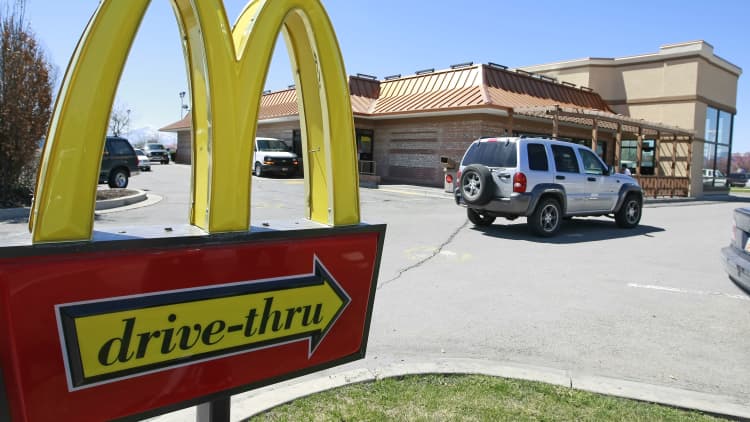
McDonald's reported better-than-expected earnings and revenue Wednesday as its modernized restaurants boosted international sales, but U.S. same-store sales were weaker than expected as the company tries to keep customers interested while it upgrades its American stores.
Shares rose less than 1 percent in trading midday Wednesday.
"We continued to transform our business by making substantial progress on modernizing our restaurants and offering more convenience, choice and value to our customers," President and CEO Steve Easterbrook said in a statement.
Net sales dropped 3 percent to $5.163 billion, but still beat Wall Street's expectations of $5.162 billion, helped by strong international sales. Its international lead segment saw same-store sales increase by 5.2 percent, topping analysts' estimates of 4.67 percent, with the U.K., Germany and Australia posting strong performances. Easterbrook credited the modernized restaurants in those countries for boosting sales.
Here's what the company reported compared with what Wall Street was expecting, based on a survey of analysts by Refinitiv:
- Earnings per share: $1.97, adjusted, vs. $1.89 expected
- Revenue: $5.163 billion vs. $5.162 billion expected
- Global same-store sales: 4.4 percent vs. 3.9 percent expected
But U.S. same-store sales fell short of estimates, with the company reporting growth of 2.3 percent during the quarter. Analysts had been expecting a 2.4 percent gain. Last year, U.S. sales at stores open at least a year rose 4.5 percent.
"Within the U.S., the pressure is particularly acute and is resulting in more disgruntlement and frustration among franchisees," GlobalData Retail analyst Neil Saunders said in a note. "The central problem is that cost growth is being outpaced by sales growth and returns are diminishing."
The company has been remodeling its U.S. stores with high-tech upgrades like self-serve kiosks. In November, it pushed its deadline for the renovations from 2020 to 2022, but it still expects a substantial number of projects to be finished at the end of 2020. Franchisees who choose to finish their renovations after 2020 will receive a smaller contribution for the project from the company.
McDonald's is planning to spend nearly $1 billion in 2019 on upgrading about 2,000 U.S. locations. In 2018, it spent $1.4 billion to remodel around 4,500 restaurants, with 10 reopening per day.
Closing stores for the upgrades had taken a toll on its same-store sales, not to mention that many franchisees have been less than pleased with the return on investment. Franchisees formed an independent advocacy group, the National Owners Association, last October. Easterbrook told analysts on the conference call that he met with some franchisees in Louisiana and Georgia recently.
The fast-food giant has been looking to promotions and new breakfast items to whet customers' appetites as U.S. sales slow. Menu prices also increased around 2 percent for the quarter.
In November, McDonald's began a limited-time offering of Triple Breakfast Stacks. The meaty breakfast sandwiches were inspired by customers' special orders. The following month, it brought back its 2 for $5 Mix & Match deal. The meal deal represents McDonald's move away from discounts like its Dollar Menu as it tries to raise the average check price to make up for declining foot traffic.
Additionally, the company said that its delivery business has reached $3 billion worldwide. In France, the U.S. and the U.K., delivery sales growth reached the high double-digits. In Canada and Russia, delivery sales increased by even more.
Globally, the fast food giant plans to add 750 restaurants in 2019.
The company attributed the 3 percent decline in revenue to the impact of its refranchising initiatives in the U.S., China and Hong Kong. The initiative is also why the company did not issue forecasts for sales and earnings in 2018.
In its earnings statement, the company reported fiscal fourth-quarter net income of $1.42 billion, or $1.82 per share, up from $698.7 million, or 87 cents per share a year earlier.
Excluding items, McDonald's earned $1.97 cents per share, beating the $1.89 per share expected by analysts surveyed by Refinitiv.
However, on Wednesday, the company reiterated its long-term, average annual financial targets starting in 2019. It is forecasting earnings per share growth in the high-single digits and sales growth of 3 to 5 percent.
Chief Financial Officer Kevin Ozan named currency fluctuations, labor and commodity costs and depreciation costs related to the store upgrades as headwinds for 2019.
McDonald's is forecasting commodity costs to increase by 1 to 2 percent in the U.S. and 2 percent in key international markets.


